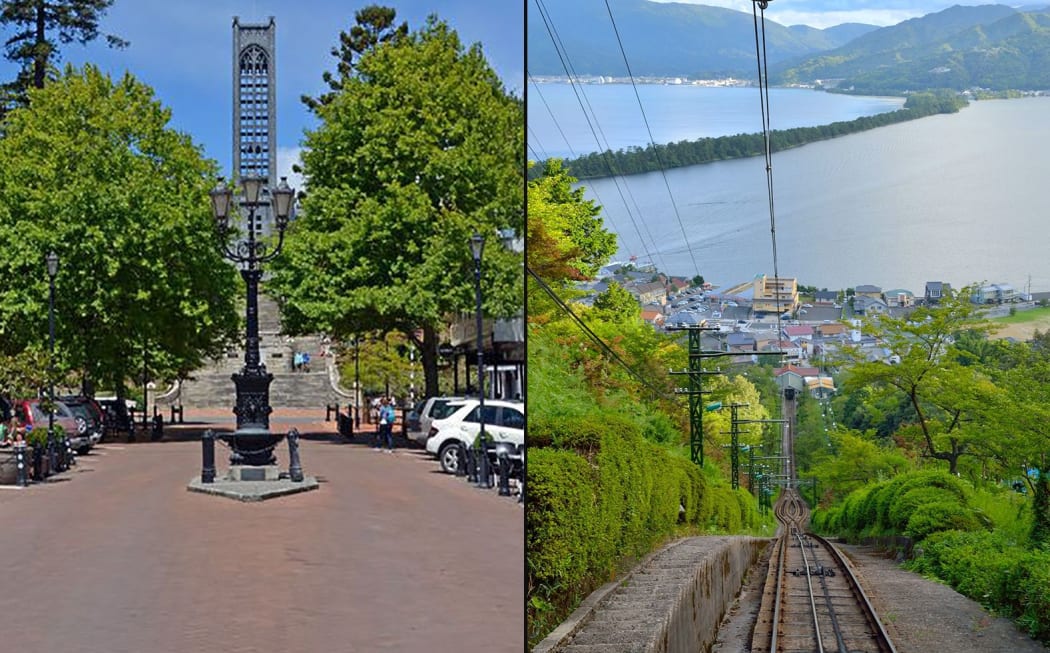Sister city connections have gone beyond fostering friendships to developing economic ties, say advocates, as Nelson re-signs a relationship with the Japanese city of Miyazu.

Sister cities Nelson, New Zealand (left) and Miyazu, Japan. Photo: RNZ
A Japanese delegation will be in Nelson this Friday to re-sign a sister-city relationship with the city of Miyazu, 40 years after it was first signed.
Questions have been raised about the value of these ratepayer funded programmes, but the vice president of the New Zealand sister cities organisation said they served a valuable purpose.
Ray Wallace - who is also Hutt City Mayor - said the sister city philosophy of building stronger relationships was "really important in this troubled world".
He added that progress in technology had allowed opportunities to develop international relationships, without the huge costs that councils might have had previously.
Nelson and Christchurch were the first cities in New Zealand to establish sister connections with Japan in the 1970s, after Rotorua first set the trend when it linked arms with Oregon's Klamath Falls in 1962.
There are now 50 cities and towns in New Zealand with twin connections around the world, built on the concept of former US President Dwight Eisenhower. He came up with the idea in 1956 in the hope that citizen diplomacy would lessen the chance of future world conflicts.
The programmes have gone beyond fostering friendships to developing economic ties.
The chief executive of Japanese-owned Nelson Pine Industries, Murray Sturgeon, said he did not expect commercial gains from the relationships. He said the company's head office was in Tokyo and it would be hard for him to say there were any great benefits from the sister city connections shared between Nelson and Richmond, and their sister cities in Japan.
"There are many cities in Japan connected with cities in New Zealand, but it's more of an ambassadorial role," Mr Sturgeon said.
Mr Wallace said spending on sister city budgets was not huge.
Nelson city has set aside $22,000 this year to cover events associated with its three sister cities. A council spokesperson said $8000 of that amount was in grants to the Nelson Miyazu Association and New Zealand China Friendship Society.
But in July, Wellington spent $51,000 on a single event, when it signed a new sister-city agreement with Canberra, tying in celebrations with a new international air service to Asia via the two capitals.
Mr Wallace said the returns were worth the spend.
"We have the educational aspect, we have a lot of international students coming here and who see New Zealand as a safe country and a place where they want to study. There's also the opportunity for business-to-business exchanges," he said.
But the New Zealand Institute of Economic Research said quantifying the economic benefits was tricky. It said in a 2003 report that data was often scarce, and sometimes commercial confidentiality restricted the information available to them.
However, New Zealand was named by the American Journal of Economics and Sociology as a good example of how to make twin town partnerships work for economic gain.
In 2012 the Palmerston North City Council reviewed its sister city connections in an exercise to measure their worth. It has just appointed Toni Grace to the newly created role of international relations manager.
She said the review found there was a lot of untapped potential in these relationships.
"Especially in relation to Palmerston North, to support the growing international sectors in education, research and trade. It was seen as a really vital component of the city's strategy," Ms Grace said.
She said councils had to be strategic in order to get the best out of a sister city connection, and that advances in technology would help reduce costs.
"It's not all about international trips. A lot of it can be down to putting effort into building the communications and people-to-people links, and engaging with the local schools and communities, as well as the formal official links between cities," Ms Grace said.


